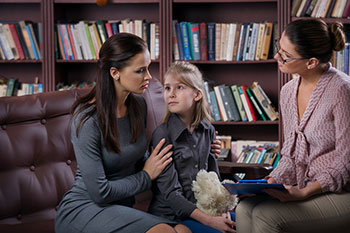
Divorce is usually painful for the couple. Often the split up of a family is particularly devastating to the children. Kids whose parents are in the process of separating or who are divorced have a tendency to react poorly and may demonstrate poor disciplinary behavior. Family therapy in Las Vegas through Kayenta is a great tool to find balance in a divorce.
Kids go through similar steps as their parents when they deal with a divorce. To help your child, you should start by trying to determine where they are in the process of coming to terms with the new familial dynamic.
Denial occurs when a child refuses to accept the fact their parents are getting or are now divorced. At this stage, kids may resist by:
Anger is the second stage of the process when kids show signs of harmful behavior. You can identify these signs when kids are:
Bargaining is when a child tries to get their parents to reconcile a marriage by:
Depression sets in when a child discovers they cannot stop their parents from splitting up. Signs of depression include:
Acceptance is the last stage in the process and when kids start to feel comfortable with their new life.
Helping your child overcome behavior issues which stem from your divorce is difficult. To make matters worse, you may feel your child’s bad behavior is your fault. It is not. Studies show while children may experience issues after a divorce, these problems are less severe than when parents remain in a bad marriage “for the sake of the kids.”
As a mother or father, there is nothing more precious than your child. While it’s unrealistic to think your divorce will not affect your kids, you can decrease behavioral issues by:
It’s difficult to help your child alone. Kayenta Therapy Centers offers family therapy Las Vegas residents can depend upon. Find out more by calling 702-438-7800 to speak with a professional family therapist and to schedule an appointment today.

An absolutely symmetrical tree adorned with elegant decorations and twinkling lights. Gifts–each perfect for its recipient–wrapped with precision. Smiling family members breaking bread, sharing hugs and happy to see one another. A light dusting of snow on Christmas morning followed by New Year’s resolutions.
For many, these are the elements of an ideal holiday season. Sadly, their expectations are likely too high. No tree is symmetrical, decorations break, lights burn out, sometimes you get the wrong gift, families fight and it almost never snows in Las Vegas–even in December.
But sometimes New Year’s resolutions are realized, and this year you should resolve to adjust your expectations. From setting budgets to accepting flaws to seeking family therapy in Las Vegas, here’s a look at how you can adjust your expectations for the holidays:
Money–or a lack of it–can cause stress, anxiety and even feelings of inadequacy. Gifts, food, travel and holiday incidentals add up quickly–especially if you are focused on making everything perfect. Instead, set a holiday budget and let it guide your expectations.
Knowing how much you can spend will automatically set your financial expectations.
It’s easy to fall in love with a “Hallmark holiday,” especially when every commercial features a picture-perfect family enjoying another ideal holiday. In reality, however, perfection is not obtainable–especially when it includes three inches of fluffy white snow on Christmas day in Las Vegas.
Ignore the idealistic notions of what holidays are supposed to be and focus instead on staying true to your family traditions.
You know how your Mom is always an hour late? Yeah, that’s not going to change this year–and that’s OK. Identifying and accepting your family members’ lifelong habits, predispositions and, flaws, is a lot easier and less stressful than expecting them to change–even if the family dinner is at your house this year.
Sometimes it’s not your expectations that lead to stress and anxiety. Sometimes it’s your assumptions about what others expect from you.
You want to get the perfect gift for a loved one but have no idea what the perfect gift might be. You assume everyone expects a formal dinner. You think friends flying in from out of state expect to stay with you.
These assumptions go hand in hand with high expectations–expectations that might not even be in line with what others want, need or expect.
So why not communicate with your friends and family? Ask what people would like for gifts. Include your guests in the dinner planning. Find out what accommodations your friends want and need. Communicating clearly will help you keep expectations in line with reality.
Sometimes people need a little professional help in the form of family therapy in Las Vegas to make it through the holidays. Kayenta Therapy Centers offers low cost family therapy in Las Vegas. Contact Kayenta Therapy Centers today at 702-438-7800 for help with holiday expectations and stress.
Bringing a new life into the world is a life-changing experience, but for many new mothers, it can also bring overwhelming emotions, including postpartum depression. If you are feeling sad, anxious, or disconnected, you’re not alone. Many women experience these emotions after childbirth, and therapy for postpartum depression can offer the support you need to overcome these challenges and thrive as a new mom.

Postpartum depression (PPD) is more than just “baby blues.” While it’s common to feel emotional highs and lows after giving birth, PPD is a serious mental health condition that affects about 1 in 7 women. Common symptoms include:
If left untreated, postpartum depression can impact your well-being and your family’s. Seeking professional help through therapy for postpartum depression is crucial to your mental health and recovery.
Therapy is a powerful tool for addressing postpartum depression. It provides a safe and supportive space for new mothers to express their emotions and receive guidance from a licensed therapist.
One of the most effective treatments for postpartum depression is Cognitive Behavioral Therapy (CBT). This therapy helps you identify and change negative thought patterns, allowing you to manage feelings of sadness, anxiety, and stress more effectively.
Therapists specializing in postpartum depression therapy understand the unique challenges new mothers face. They can provide coping strategies, help you reconnect with your baby, and support you in building a healthy routine that balances your needs with those of your newborn.
Seeking therapy for postpartum depression isn’t just about treating the symptoms—it’s about reclaiming your mental health. Therapy offers:
If you’ve been feeling consistently down, anxious, or overwhelmed for more than two weeks after giving birth, it’s time to reach out. Therapy for postpartum depression can help you get back on track and enjoy motherhood without the weight of PPD.
Postpartum depression can feel isolating, but you don’t have to go through it alone. At Kayenta Therapy, we offer compassionate and professional therapy for postpartum depression, designed to help you heal and thrive as a new mother. Take the first step toward feeling better today.
Divorce can be a difficult experience for children, often leaving them confused, hurt, and overwhelmed. Helping kids cope with divorce is crucial for their emotional well-being. Therapy provides a safe space where children can express their feelings, learn coping skills, and navigate the changes divorce brings. At Kayenta Therapy, we specialize in supporting families through this challenging time.

Cute little girl talking to child psychologist during therapy session in cozy modern office
Divorce affects children in different ways, depending on their age, personality, and family dynamic. While some children may act out, others might internalize their feelings, leading to anxiety or depression. Therapy offers an outlet for emotional expression and healing, helping kids cope with divorce in a healthy and constructive manner.
Children of all ages can experience a range of emotions during and after a divorce, including sadness, anger, confusion, and fear of the unknown. They may blame themselves or feel torn between their parents. This emotional turmoil can lead to long-term issues if left unaddressed. Therapy plays a crucial role in helping kids understand and process their emotions, reducing the likelihood of long-lasting emotional scars.
Therapy for children dealing with divorce provides various benefits, including:
At Kayenta Therapy, we offer several types of therapy to help children cope with divorce:
If your child is struggling to cope with divorce and you notice signs of withdrawal, mood swings, or changes in behavior, seeking therapy may be the best step. Early intervention can prevent more serious emotional issues from developing and provide your child with the tools they need to manage their emotions effectively.
Divorce is never easy, but with the right support, children can navigate this challenging transition in a healthy and positive way. At Kayenta Therapy, we’re dedicated to helping kids cope with divorce by providing compassionate, personalized therapy services. If your family is going through a divorce, we’re here to help your child heal emotionally and build resilience for the future. Contact us today to learn more about our child and family therapy services!
Social anxiety affects millions of people worldwide, significantly impacting their ability to connect with others and enjoy daily life. According to the National Institute of Mental Health, about 12.1% of U.S. adults experience social anxiety at some point in their lives. While this condition can feel isolating, effective strategies and therapy can help you reclaim your confidence and well-being.

Social anxiety is more than just shyness—it’s a persistent fear of being judged, embarrassed, or humiliated in social settings. It can manifest as physical symptoms like sweating, trembling, or a racing heart, as well as emotional distress that makes it difficult to engage in conversations, attend events, or even make phone calls. Without proper intervention, social anxiety can lead to missed opportunities and strained relationships.
While overcoming social anxiety takes time and effort, these proven strategies can help ease its grip:
For many individuals, therapy offers the most effective path to relief. Cognitive Behavioral Therapy (CBT), in particular, is considered the gold standard for treating social anxiety. A study published in Psychological Medicine found that 62% of participants who underwent CBT saw significant improvement in their symptoms.
Therapists help clients identify and reframe negative thought patterns, practice social skills in a safe environment, and develop coping mechanisms for anxiety-provoking situations. In some cases, therapy may also involve role-playing exercises to simulate real-life social interactions, enabling clients to gain confidence and reduce their fears.
If social anxiety is interfering with your ability to live a fulfilling life, it may be time to seek professional support. Therapy can help you uncover the root causes of your anxiety, develop practical strategies, and find lasting relief. Combining therapy with self-help strategies can often produce the best results.
Living with social anxiety doesn’t have to be a lifelong struggle. Therapy can provide the tools you need to thrive in social settings and build meaningful connections. If you’re ready to make a change, Book an Appointment Today to start your journey toward a more confident and fulfilling life.
Every couple experiences conflict and differences during their time together, which they’re often able to resolve on their own. However, there are times when stress and disagreements threaten to disrupt a relationship, making it beneficial to seek outside help. Seeking professional guidance can be a crucial step in nurturing a healthy and fulfilling relationship. But while it can be an invaluable option, finding affordable couples therapy that suits your needs can sometimes feel like a challenge.

In fact, believing couples therapy “could really help, but it might be too expensive” is a common barrier preventing many couples from taking the first step.
The skilled, independent therapy providers at Kayenta Therapy offer a range of affordable options for couples seeking therapy in the greater Las Vegas area. Connecting with the right therapist for your needs can help you learn, grow, and heal together, all without breaking the bank.
Is it possible to find affordable couples therapy in Las Vegas? Absolutely! Our therapists offer a range of options, including low-cost programs that improve your chances of finding the help you need at a price you can afford.
Following these practical suggestions, you can improve your chances of finding high-quality yet cost-effective couples therapy.
Search online for potential therapists and counseling centers in your area. Read reviews from previous clients to gauge the therapists’ expertise, approach, and overall satisfaction rates. Reputable therapists will often have reviews readily available online or through referral sources. And speaking of referrals, your healthcare provider can be a terrific source of recommendations.
Ensure the therapist you’re considering is licensed and accredited by the appropriate governing bodies. This guarantees they’ve completed the necessary training and adhere to ethical standards in their practice. Kayenta Therapy’s licensed therapists are independent private practitioners who have advanced degrees, including:
A number of our therapists offer low-cost options, so don’t hesitate to inquire about this opportunity to make quality therapy more accessible and affordable. There’s no reason you need to put off strengthening your relationship due to financial worries.
Teletherapy can be a more affordable alternative to traditional one-on-one couples therapy. While it’s not necessarily suitable for every couple, it can provide valuable support at a lower cost, helping you return to smoother sailing within your relationship.
Kayenta Therapy is Nevada’s largest private practice relationship counseling center. Our therapists are dedicated to helping couples thrive in their relationships. Whether you choose in-office, online, or teletherapy, you’re sure to find the right licensed counselor at for your needs.
Request an appointment online or call 702-438-7800 to begin your journey towards a more rewarding relationship today.
Technology has revolutionized the field of therapy, providing innovative ways for individuals to seek counseling services and receive the help they need. At Kayenta Therapy, we wholeheartedly embrace the power of online therapy, specifically through platforms like Zoom, as a means of building deeper connections with our clients and offering meaningful support.

Our licensed therapists are dedicated to the transformative potential of teletherapy and believe that it can create therapeutic relationships that are just as strong as those formed in face-to-face sessions. By utilizing online platforms, we are able to overcome barriers and provide effective therapy to individuals seeking support.
Online therapy, conducted through platforms like Zoom, offers a convenient, accessible, and effective solution for individuals in need of support. It provides therapists and clients with a flexible and supportive environment that promotes personal growth and overall well-being.
While some individuals may prefer in-person therapy, online therapy via Zoom offers several benefits that others find appealing:
We firmly believe that everyone possesses the power to change, and online therapy makes growth and mental well-being accessible to all. The online therapy services provided by Kayenta Therapy eliminate traditional obstacles like geographical limitations and physical disabilities, empowering individuals to take control of their mental health journeys.
To learn more about the convenience and flexibility of online therapy via Zoom, we invite you to contact one of our therapists directly through our online platform. Schedule an appointment today and embark on a transformative and deeply connected therapeutic experience.

The ways we interact with others can have an impact on our emotional well-being. Healthy and mutually beneficial relationships help us grow and learn how to give and receive love. Relational therapy in Las Vegas can help you explore how familial relationships and past experiences have influenced your patterns of relating to others and shaped your self-image.
Relational therapy is an approach based on the idea that our social world and good relationships are critical to our psychological health and self-esteem. It also helps you discover new ways of interacting with people and your environment.
Relational therapy can help with a wide range of issues, which are sometimes connected to stress or disharmony in relationships. This type of therapy can help you learn to identify problematic patterns and change them. Relational therapy in Las Vegas helps with difficulties and disorders such as:
If you have a tendency to push people away or you’re experiencing distress in your relationships, relational therapy may be a good therapeutic approach for you. It can help improve relationships of any kind, including those with family, romantic partners, friends, and coworkers.
Relational therapy is based on relational-cultural theory, which examines how human connection and culture influence relationships and individuals. In relational therapy, you’ll discuss past experiences and your therapist will invite you to explore how they may influence your behaviors today.
A key element of relational therapy is the integration of cognitive-behavioral therapy (CBT), which helps you learn how to identify faulty thinking patterns and change them. It also promotes healthier behaviors and improved self-awareness.
Applying these principles to your interactions with others can help you develop healthier, long-lasting relationships with the people in your life. Relational therapy can also help strengthen your sense of self and agency over your actions and empower you to have more trust in and patience with others. Building healthy boundaries while learning to compromise can help create balance in all aspects of your life, including your relationship with yourself.
This is just a snapshot of how relational therapy may work for you. A therapist can give you a more in-depth understanding of relational therapy and advise you of their specific methods for utilizing it in therapy sessions. Forming a successful relationship with your therapist is a critical element of relational therapy. Finding a therapist who is empathetic and non-judgmental will help you feel comfortable sharing personal matters with them. Don’t hesitate to ask about their professional credentials and specific areas of training as well.
Are you ready to try relational therapy in Las Vegas with a compassionate, competent mental health professional? Contact a therapist directly to schedule an in-person or teletherapy appointment at Kayenta Therapy.

It’s common for people to make resolutions and set goals for the new year. While it’s great to commit yourself to do things that you want to accomplish, making your mental health a priority can help you build a strong foundation that helps you handle life’s challenges and understand yourself better. Whether you’re feeling down or you’re interested in learning coping skills to deal with stress and anxiety, talking to a therapist can be an effective way to improve your mental health.
One bright side of the Covid-19 pandemic is that teletherapy has made counseling services more accessible than ever. These sessions work much the same way as traditional therapy sessions, except they are done via videoconferencing instead of in an office. One of the major benefits of teletherapy is that it’s a convenient, confidential way to connect with a therapist without having to leave your home.
We all face hurdles that are tough to tackle sometimes. Prioritizing your mental health can help you learn how to deal with challenging emotions and situations more healthily. Although anyone can benefit from talking to a therapist, some signs that it may be time to seek help include:
Just like your car needs periodic maintenance, your mental health may need a tune-up from time to time. Not only does therapy give you the tools to live a healthier, happier life, but it can also help you identify certain triggers and negative patterns and learn how to change them. Treatments like psychoanalysis, cognitive behavioral therapy (CBT), and dialectical behavioral therapy (DBT) are just as effective in teletherapy as they are in person.
Learning how to accept and deal with distressing emotions and situations and change your ways of thinking can be life-altering. It’s also important to keep in mind that you are not alone. Your therapist is there to help you get through it and provide the support and tools you need to feel better. Teletherapy can also help you achieve your goals, improve your overall health and well-being, and lead to more fulfilling relationships with loved ones.
If you’re ready to prioritize your mental health this new year, the professionals at Kayenta Therapy provide compassionate, convenient therapy services you can trust. Contact a therapist directly to schedule an in-person or teletherapy appointment.
Video game addiction is a behavioral disorder involving problematic gaming habits that have a negative impact on a person’s ability to function and take care of social, personal, educational, and work-related responsibilities. If excessive gaming is disrupting your life, seeking therapy in Las Vegas can help you learn how to change your behavior and improve your mental health.
 Although it’s great to have a hobby you enjoy, when it starts getting in the way of other important things in your life it may be time to consider cutting back. It can be tough to see your issues – this list of symptoms can help you identify whether you may have a problem with excessive gaming.
Although it’s great to have a hobby you enjoy, when it starts getting in the way of other important things in your life it may be time to consider cutting back. It can be tough to see your issues – this list of symptoms can help you identify whether you may have a problem with excessive gaming.
If you’re a parent who’s concerned about your child’s gaming habits, take a look at how they’re doing in school, their relationships with friends, and whether they’re having any problems at home. If you notice a few of these symptoms in your child, you may want to talk to them about seeking therapy.
Although video games have been around for decades, treatment for gaming addiction is in its early stages. Studies have shown that cognitive behavioral therapy (CBT) can be effective in addressing address related to video games and internet addiction. Talk therapy, lifestyle changes, and support from family and friends are also important aspects of overcoming any addiction.
Therapy can help you address the problematic behavior by exploring the motivations and reasons for your use of video games. Cognitive behavioral therapy focuses on how your thoughts and beliefs directly affect your feelings and behaviors. Your therapist can help you learn how to use CBT to modify your actions and behaviors by changing your thoughts and feelings about gaming.
For example, if you believe gaming delivers a more positive result than another behavior, such as working out, you’ll likely choose to game every time. By adjusting the way you think about these activities and outcomes, you can change your actions, which can help you choose healthier behaviors and break the pattern of excessive gaming. CBT also helps you identify self-defeating or negative thoughts and learn new ways to cope to make choices that enhance your mental health.
Mindfulness exercises can also be an effective tool for overcoming video game addiction. Becoming more aware of your inner experiences and how they affect your behavior can increase your mental flexibility and help you address the emotional difficulties that drive your addiction.
It’s also important to remember that gaming addiction isn’t a moral failing. These games are designed to make you want to keep playing. It’s believed that playing video games can produce high amounts of dopamine, the same neurochemical associated with substance use disorders. If you’re suffering from video game addiction, don’t beat yourself up – taking steps to get the help you need can put you back on track and live a healthier, happier life.
Contact a therapist at Kayenta today to schedule an in-person or teletherapy appointment.